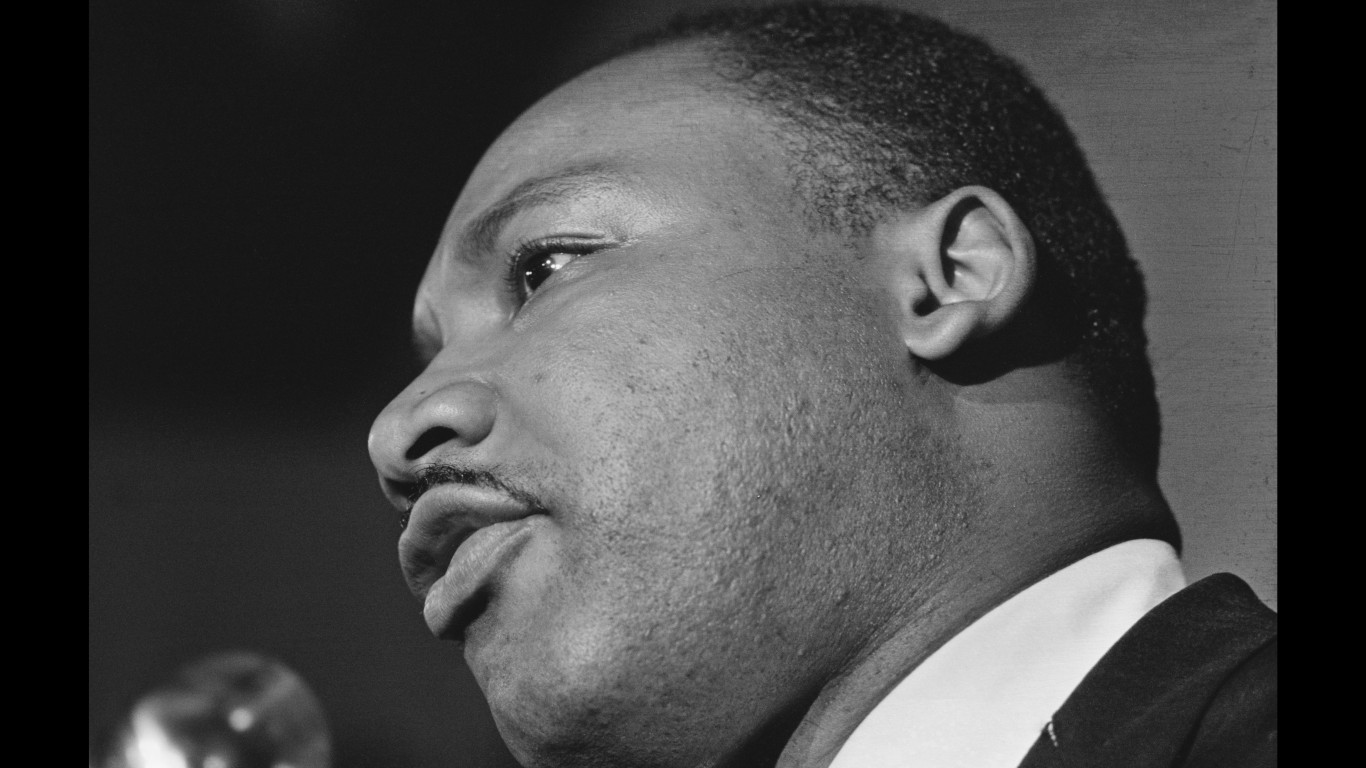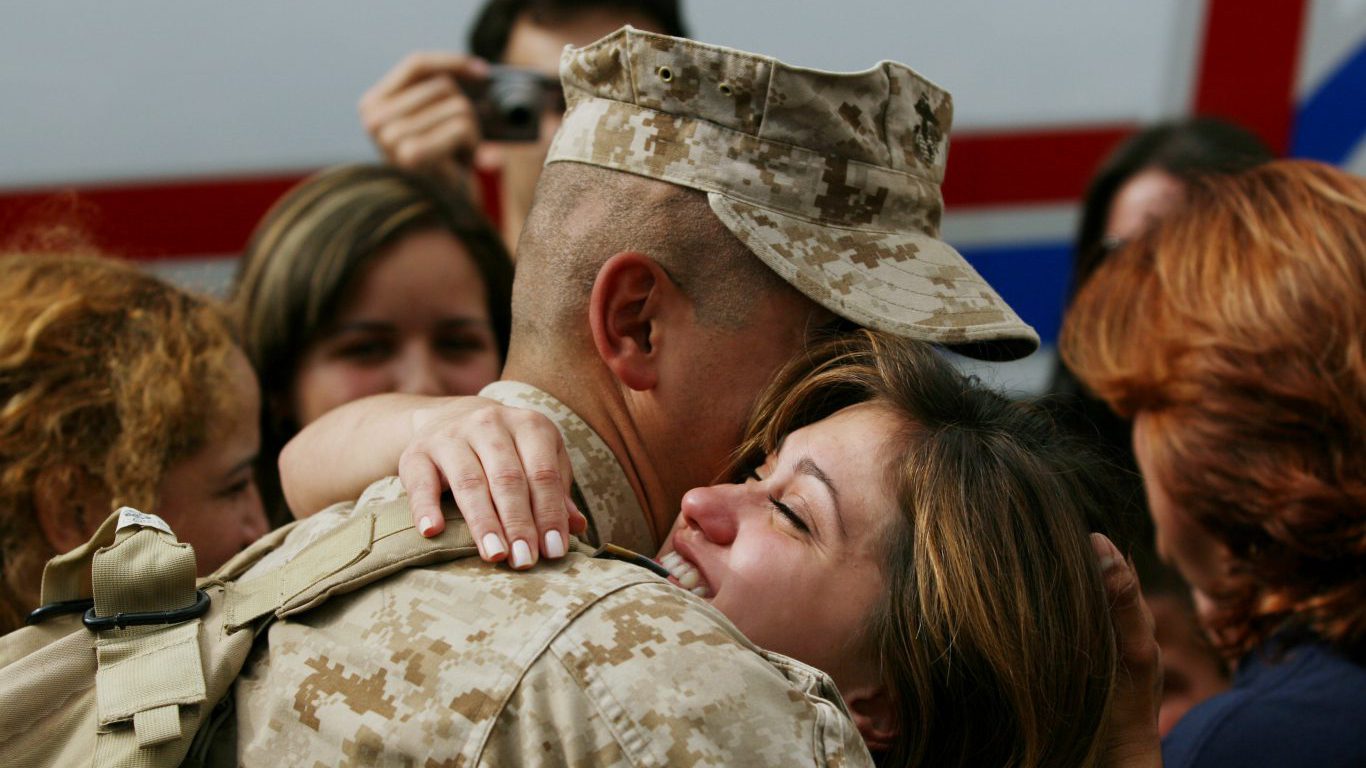
President Donald J. Trump traveled to Fort Drum in upstate New York this week to sign the National Defense Authorization Act into law. The bill, which was approved by Congress last month, authorizes $717 billion in military spending for fiscal 2019, a more than $80 billion increase from the previous year. The 2019 defense budget will be the largest it has been since the height of the Iraq War in 2011.
While the bill covers a wide range of state-of-the-art military weapons systems — as well as strategic defense technology designed for use in outer space — much of it goes directly to military servicemen and women.
Included in this year’s bill is a 2.6% raise for active duty servicemen and women — the largest increase in pay in nearly a decade. The bill will also allocate billions of dollars to spousal and community support, child care for military children, schools, and counseling services.
There are more than 1.1 million active duty service men and women — as well as 1.5 million of their family members — on hundreds of bases across the United States. Military populations and their families have a considerable economic and social impact in the cities in which they live. In many cases, the number of on-base military-affiliated personnel is equivalent to 5%, 10%, and in some cases, over 30% of the broader metro area’s population.
24/7 Wall St. reviewed the number of active duty men and women, in addition to their dependents, living on bases in major metropolitan areas across the country to determine America’s top military cities. Metro areas were ranked on the number of military personnel and known dependents as a percent of the the total metro area population. The dependent figures reflect the number of known dependents affiliated with active duty servicemen and women, whether or not they live on-base. Many of the cities with relatively large military populations are also home larger-than-typical shares of veterans.
Fort Drum, the backdrop for the 2019 defense budget signing, is the largest military base in the northeastern United States.
Click here to see America’s military cities.
Click here to see our detailed findings and methodology.
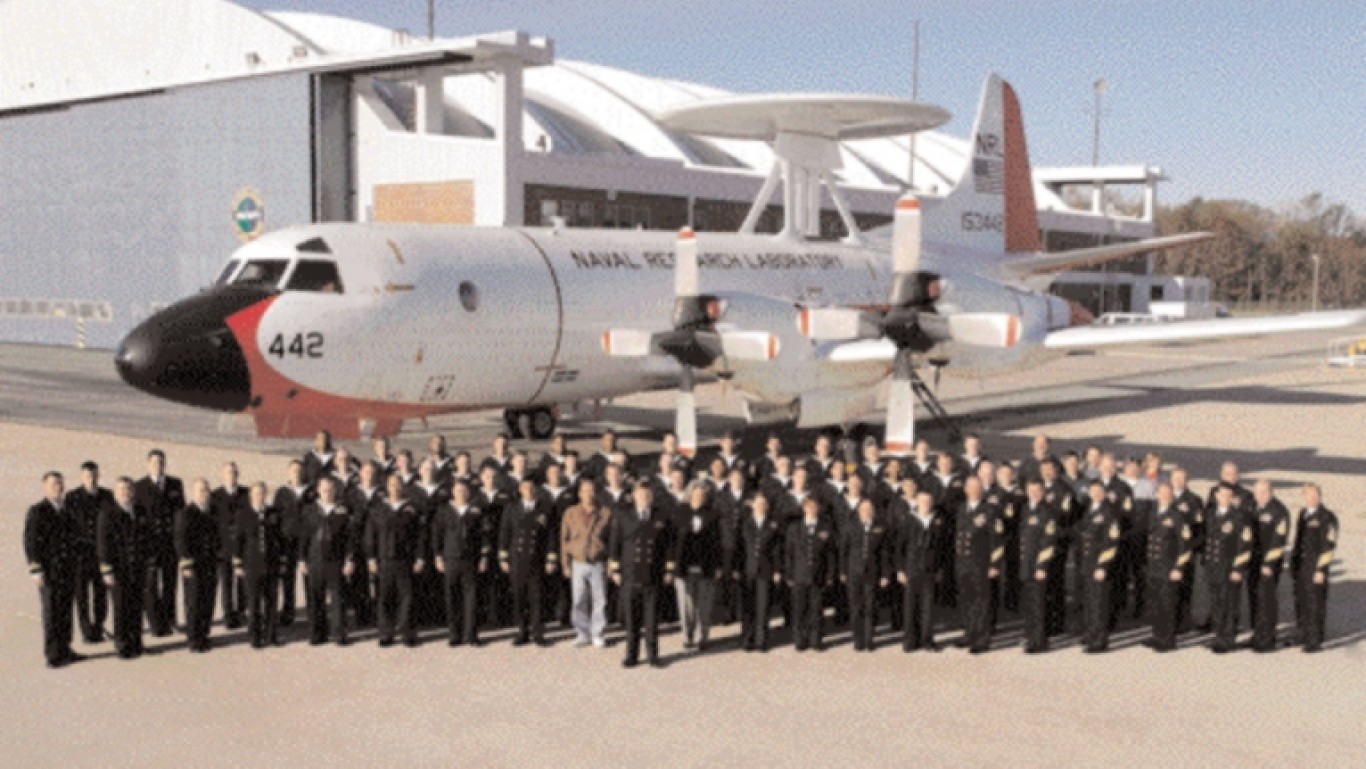
25. California-Lexington Park, MD
> Military members & families: 6,795 (6.0% of pop.)
> Largest military base: Patuxent River Naval Air Station
> Veterans: 12,942 (11.5% of pop.)
Maryland’s defense spending in fiscal 2015 totalled $20.5 billion, or about 5.7% of its GDP — the fifth highest percentage of all states. The high defense spending is due in part to the presence of several large military installations in the state. One of them is the Patuxent River Naval Air Station, located about 65 miles from the nation’s capital and home to approximately 2,359 active service men and women and many of their 4,436 dependents.
As is often the case in metro areas with large military installations, the California-Lexington Park metro area has a considerable veteran population. The metro area is home to nearly 13,000 veterans, comprising 11.5% of the total population.
[in-text-ad]
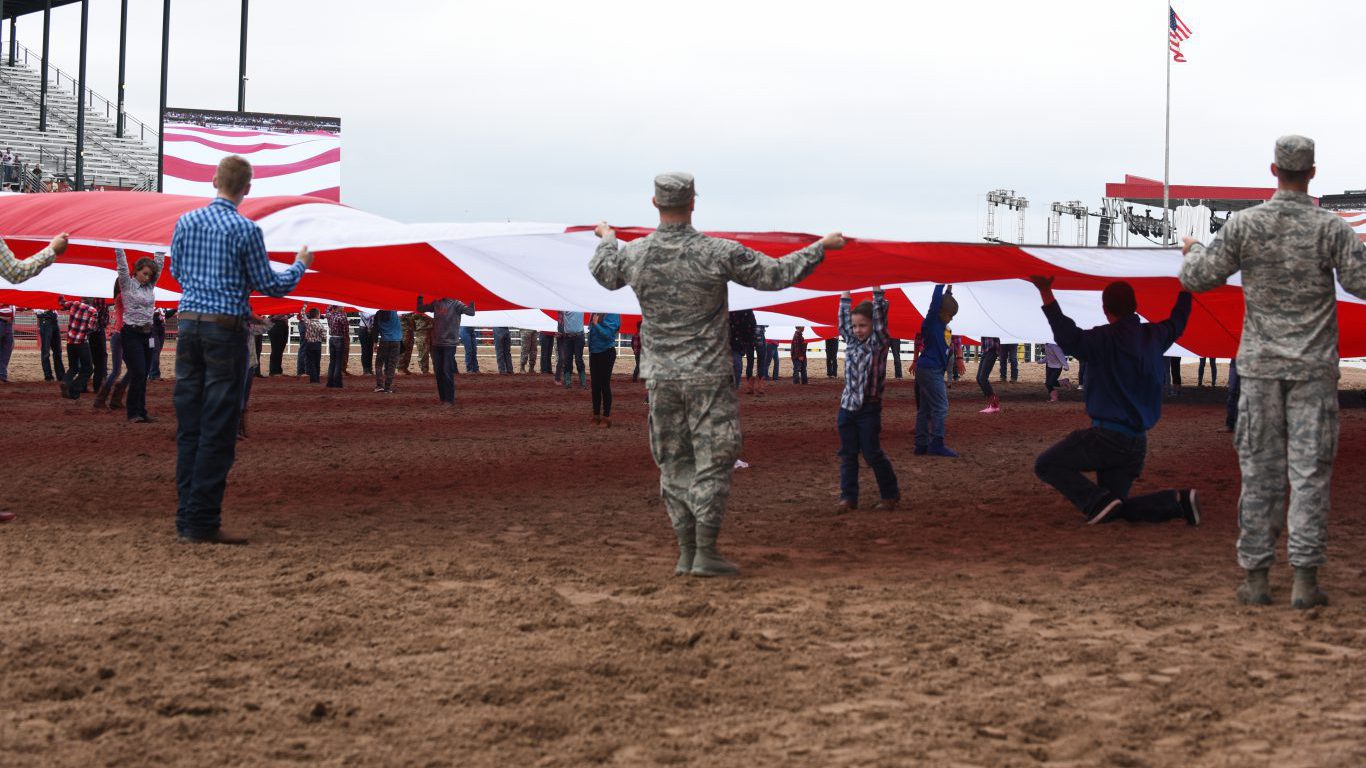
24. Cheyenne, WY
> Military members & families: 6,433 (6.6% of pop.)
> Largest military base: Francis E Warren Air Force Base
> Veterans: 12,085 (12.3% of pop.)
The Francis E. Warren Air Force Base in Cheyenne is one of the few military installations in Wyoming. Originally named Fort Russell, when it was founded in 1867, Warren AFB is the oldest U.S. Air Force installation in the world. The base was used as a training camp during World War I and became the first intercontinental ballistic missile base in the United States in 1957.
Today, in addition to having a combat-ready arsenal of intercontinental ballistic missiles, the base houses support centers and local headquarters for the Air Force, Navy, and National Guard. It is currently home to nearly 3,000 active duty personnel and many of their 3,500 dependents — equal to 6.6% of the Cheyenne metro area’s total population.

23. Wichita Falls, TX
> Military members & families: 9,991 (6.6% of pop.)
> Largest military base: Sheppard Air Force Base
> Veterans: 13,601 (9.0% of pop.)
The Wichita Falls metro area is home to the Sheppard Air Force Base. The base hosts the Euro-NATO Joint Jet Pilot Training Program, the only multinationally manned flight training program designed to produce combat pilots for NATO. Sheppard is the most diversified base in Air Education and Training Command, providing technical, medical, and field training for officers, airmen, and civilians in all branches of the military.
The 10,000 servicemen and women and their families affiliated with the base constitute 6.6% of the metro area population, one of the largest shares of any U.S. city.
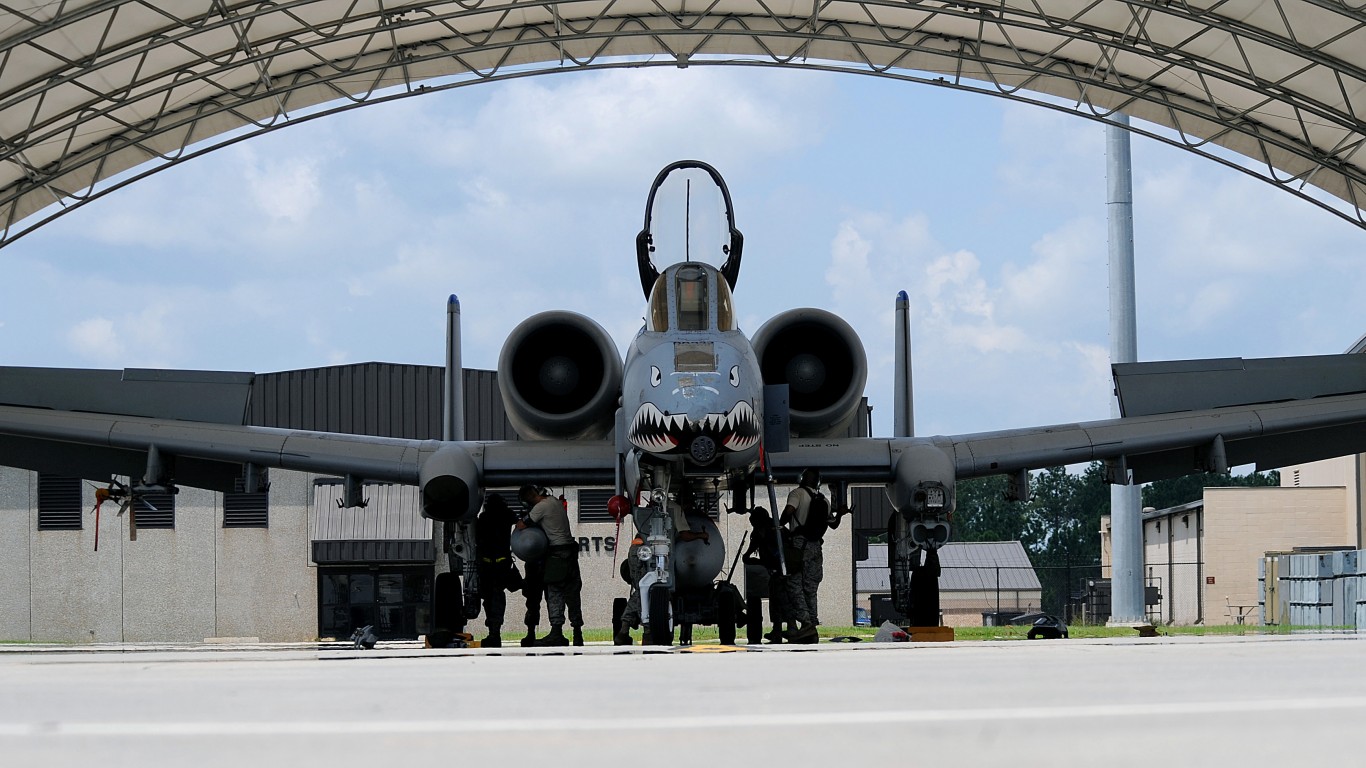
22. Valdosta, GA
> Military members & families: 9,961 (6.9% of pop.)
> Largest military base: Moody Air Force Base
> Veterans: 12,619 (8.7% of pop.)
Valdosta is one of several Georgia cities with a large military population. Military operations first began at Moody Field in 1941 with a total of 140 personnel, and today Moody Air Force Base is home to nearly 10,000 service men and women and their families. Moody Air Force Base is also by far the largest employer in Valdosta, accounting for one in every 10 jobs in the city. To safeguard their city’s economic engine, Valdosta officials travel to Washington, D.C. at least once a year to advocate for the continued operation of Moody AFB. The Valdosta-Lowndes Chamber of Commerce also runs an initiative to help veterans of Moody AFB find employment in the region. Some 12,619 veterans currently live in Valdosta, one of the largest veteran populations of any metro area when adjusted for total city size.
[in-text-ad-2]

21. Sierra Vista-Douglas, AZ
> Military members & families: 8,844 (7.0% of pop.)
> Largest military base: Fort Huachuca
> Veterans: 19,970 (15.9% of pop.)
The Sierra Vista-Douglas, Arizona metro area is home to the Fort Huachuca army base and its 3,600 active duty service men and women and many of their 5,200 dependents. The facility functions as a development and test site for various communications, reconnaissance, and combat systems including unmanned aerial vehicles.
Like many metro areas on this list, Sierra Vista-Douglas is also home to thousands of veterans. The number of active duty service men and women and veterans is equal to roughly 23% of the metro area’s total population.
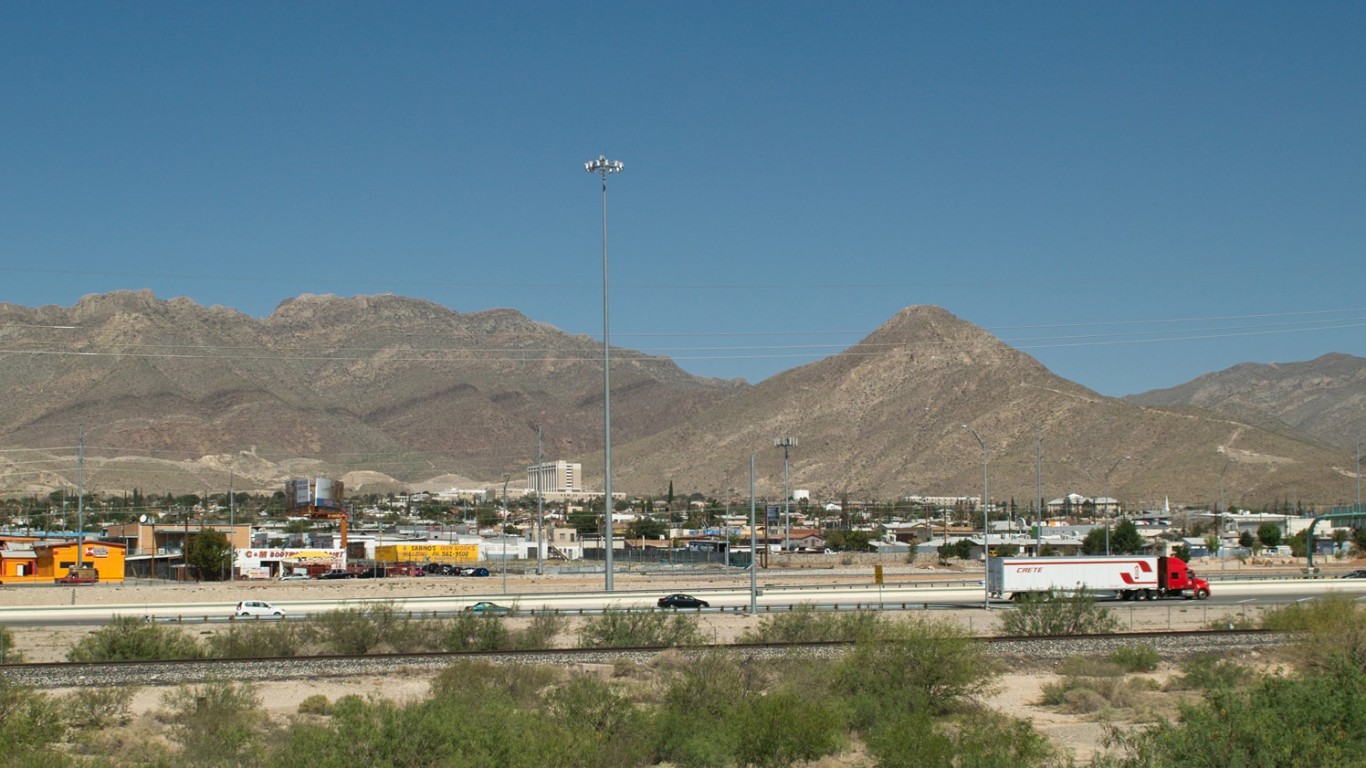
20. El Paso, TX
> Military members & families: 62,490 (7.4% of pop.)
> Largest military base: Fort Bliss
> Veterans: 58,833 (7.0% of pop.)
First established in 1848, Fort Bliss is the second largest Army base by land area and is among the largest by personnel. As a result of a major base realignment plan in 2005, which shifted troops from the 1st Armored Division in Germany as well as units from Fort Sill in Oklahoma and Fort Hood in central Texas to Fort Bliss, El Paso’s major army base has expanded rapidly over the past decade. The number of active duty servicemen and women rose from 11,407 in 2005 to 25,546 today.
Fort Bliss also has some of the best amenities of any Army base, which include the army’s largest bowling complex and banquet hall. Including the 36,944 spouses and family members affiliated with the base, Fort Bliss personnel amount to 7.4% of the El Paso metro area population, one of the largest shares of any city.
[in-text-ad]

19. Goldsboro, NC
> Military members & families: 9,334 (7.5% of pop.)
> Largest military base: Seymour Johnson Air Force Base
> Veterans: 12,730 (10.3% of pop.)
The Seymour Johnson Air Force Base is host to some 4,200 active duty service men and women and many of their 5,146 dependents. The base was established less than six months after the United States entered World War II. It is currently the only military installation in the Goldsboro metro area and one of seven bases across North Carolina.
Though the base is far from the largest in the state, it is partially the reason North Carolina is one of six states which together are home to nearly half of all active duty service men and women in the country. Overall, military installations in North Carolina support over half a million jobs.
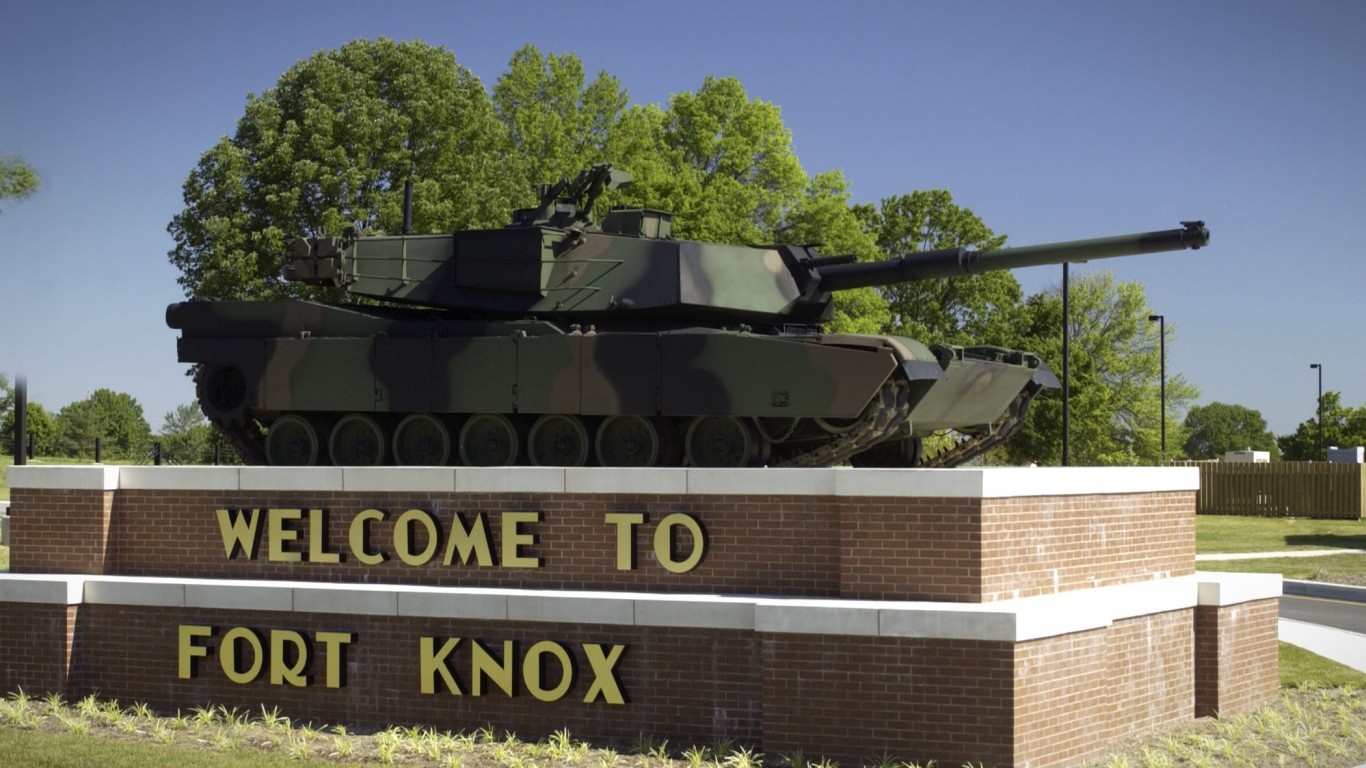
18. Elizabethtown-Fort Knox, KY
> Military members & families: 11,613 (7.7% of pop.)
> Largest military base: Fort Knox
> Veterans: 21,477 (14.3% of pop.)
The Elizabethtown metro area is home to Fort Knox, an army installation that is home to the U.S. Army Recruiting Command, the First Army Division East, the 19th Engineer Battalion, and over two dozen other units. Fort Knox also houses the U.S. Bullion Depository, a vault closed to the public containing an estimated 56.3% of the nation’s gold reserves.
While the size of Fort Knox fell from 8,905 active duty service men and women in 2005 to 4,772 today as the result of the 2005 Base Realignment and Closure recommendations, it is still one of the largest military cities in the country. Including the 6,841 spouses and family members affiliated with Fort Knox, the army post amounts to 7.7% of the Elizabethtown metro area population, one of the largest shares nationwide.
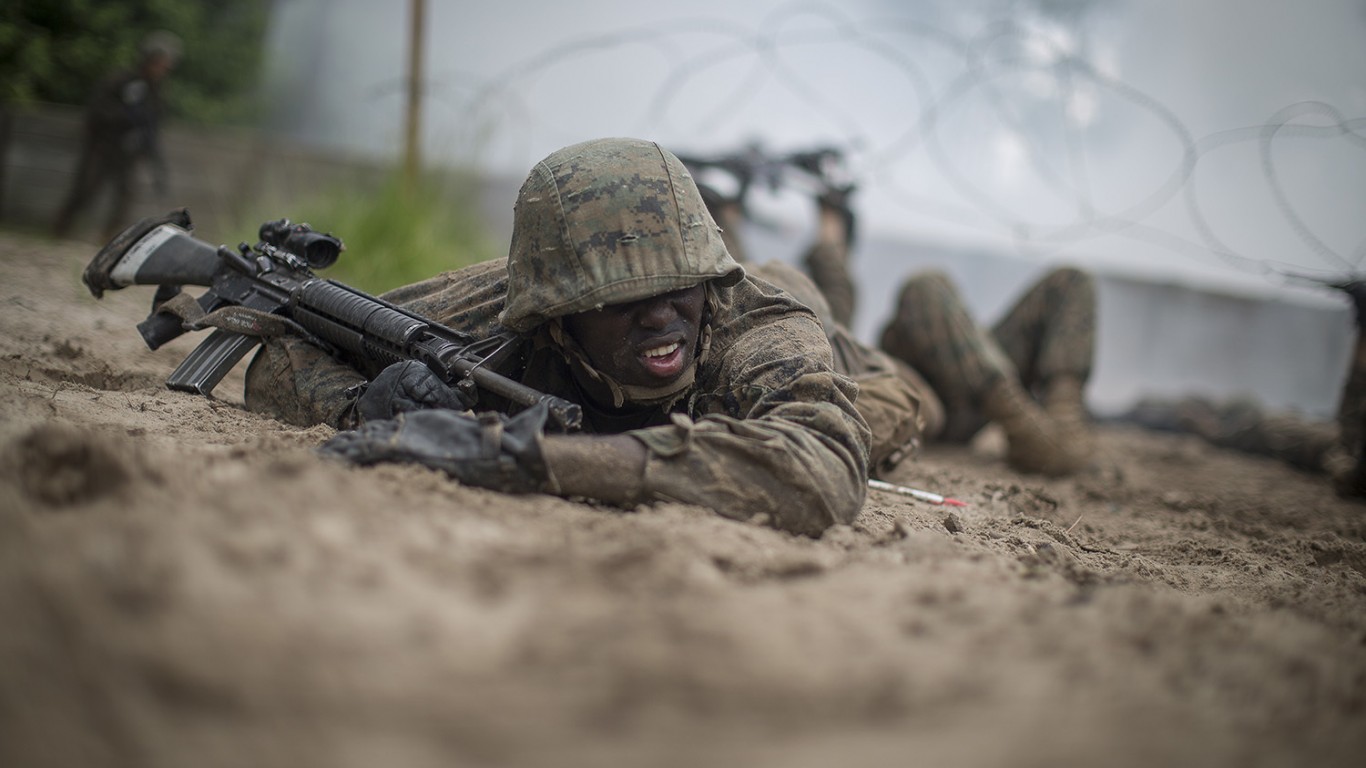
17. Hilton Head Island-Bluffton-Beaufort, SC
> Military members & families: 17,468 (8.3% of pop.)
> Largest military base: Parris Island Marine Corps Recruit Depot
> Veterans: 25,566 (12.1% of pop.)
The Hilton Head Island-Bluffton-Beaufort metro area is home to two military installations: the Parris Island Marine Corps Recruit Depot and the Beaufort Marine Corps Air Station. Together, the facilities host nearly 10,800 active duty service men and women and several thousand of their family members. The base on Parris Island primarily serves as a training and recruitment installation for the Marine Corps while the air station at Beaufort is home to the Marine Corps’ Atlantic Coast fixed wing fleet of fighter jets and is the only installation where pilots train to fly the F-35B, a short take off and vertical landing stealth fighter jet.
[in-text-ad-2]
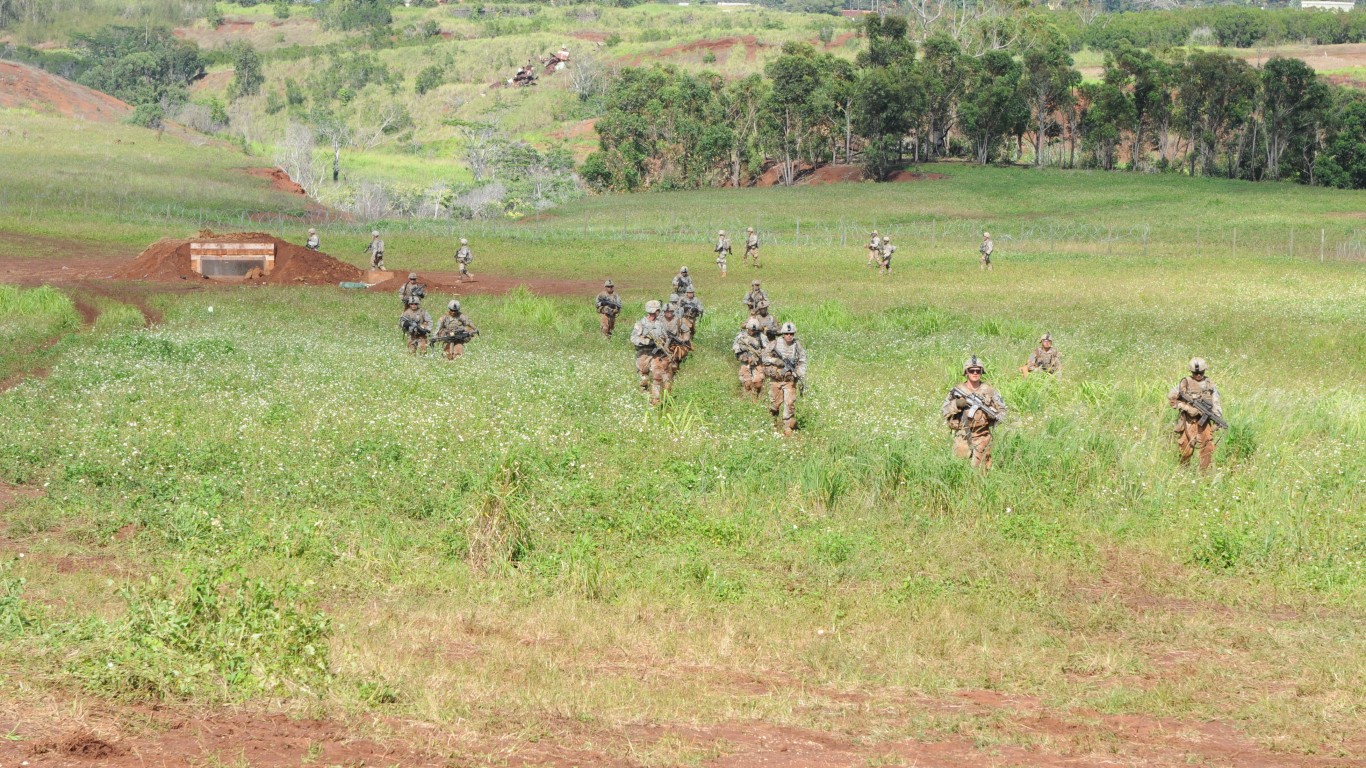
16. Urban Honolulu, HI
> Military members & families: 94,876 (9.6% of pop.)
> Largest military base: Schofield Barracks
> Veterans: 83,651 (8.4% of pop.)
There are a half dozen military installations in the Honolulu metro area, the largest of which is the Schofield Barracks installation. The Barracks are home to nearly 40,000 military members and dependents. In total the Barracks’ population comprises 42.1% of all active duty service men and women and military families in the Honolulu metro area. Children of enlisted troops living on the base attend school in the nearby Central Oahu School District.
The 18,000-acre installation was established in 1908 as the base for the army’s mobile defense of the island and the Pearl Harbor Naval Base located about 20 miles south.
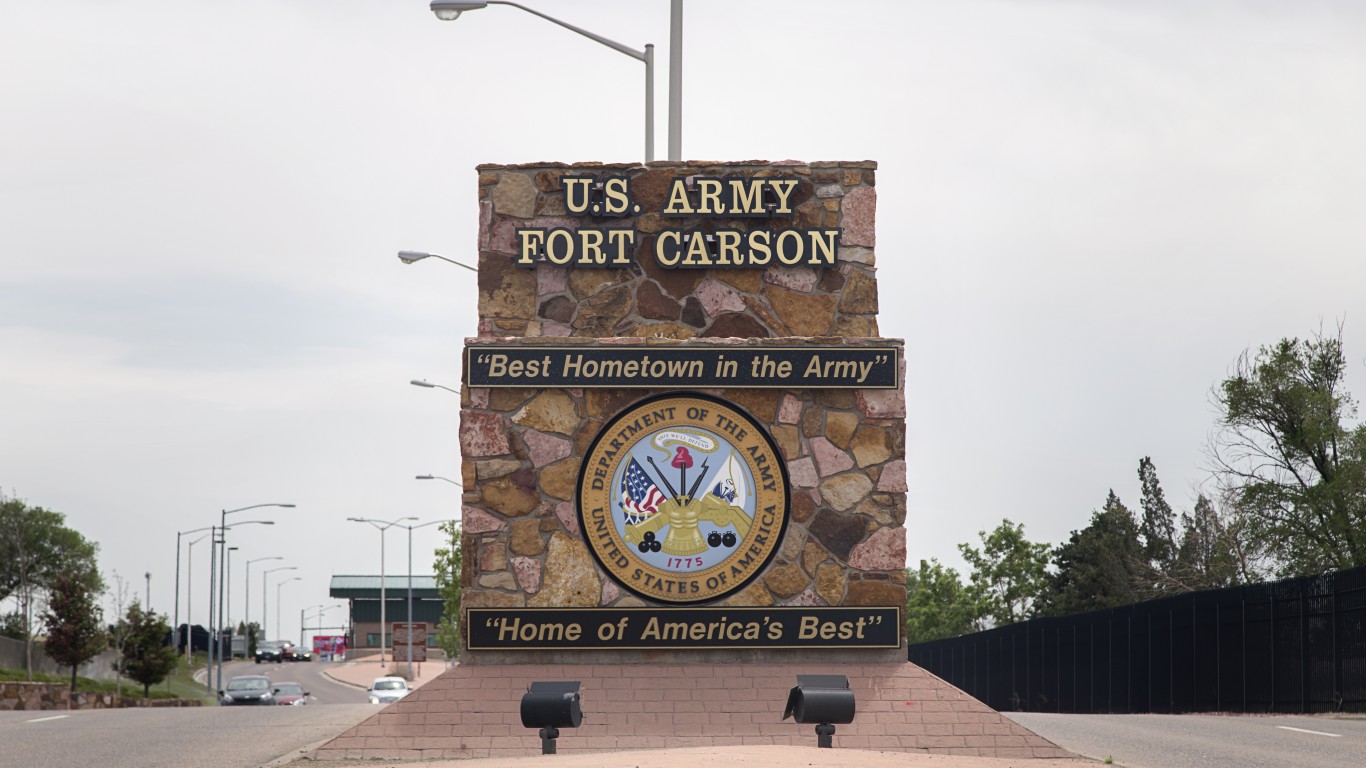
15. Colorado Springs, CO
> Military members & families: 75,427 (10.6% of pop.)
> Largest military base: Fort Carson
> Veterans: 102,928 (14.4% of pop.)
The Colorado Springs metro area is home to three military installations: the U.S. Air Force Academy, Peterson Air Force Base, and Fort Carson. The U.S. Air Force Academy, located roughly 20 miles north of the Peterson Air Force Base, is highly competitive, accepting just about 1,000 of the 12,000 undergraduate applicants every year. Peterson Air Force Base is home to the North American Aerospace Defense Command, U.S. Northern Command, Air Force Space Command, and Space and Missile Defense Command.
The largest military installation in Colorado Springs is Fort Carson, home to 24,034 servicemen and women and many of their 35,886 spouses and family members. In total, there are 75,427 military personnel and family members associated with the metro area, equivalent to 10.6% of the Colorado Springs population.
[in-text-ad]
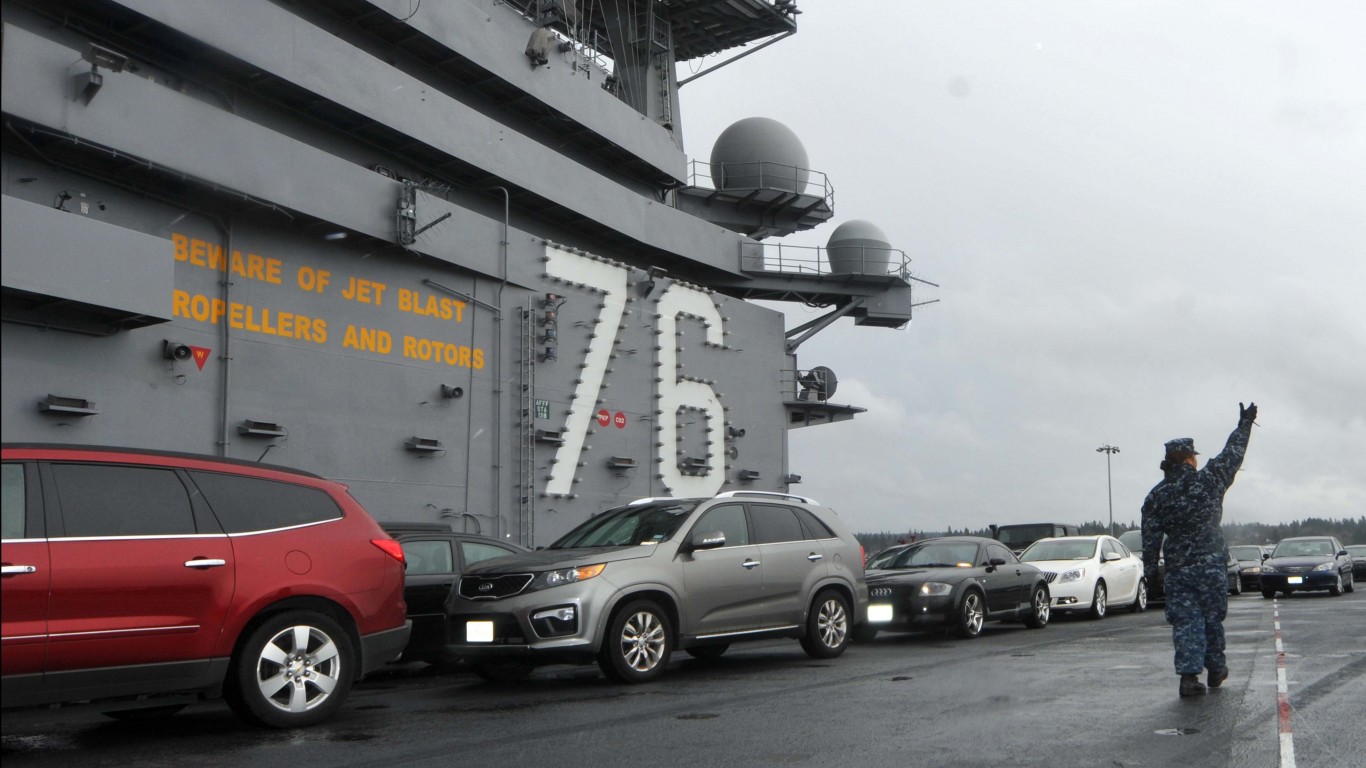
14. Bremerton-Silverdale, WA
> Military members & families: 29,097 (11.0% of pop.)
> Largest military base: Naval Base Kitsap-Bremerton
> Veterans: 37,137 (14.0% of pop.)
The number of active duty service men and women and their families as well as veterans in Bremerton-Silverdale equal about one-quarter of the metro area’s total population. The metro area is home to two U.S. Navy installations: Naval Base Kitsap — comprised of the naval station in Bremerton and the naval submarine base in Bangor — and the Bremerton naval hospital. Roughly 29,000 active duty service men and women and their dependents are associated with Naval Base Kitsap.
As a whole, Washington state is one of the largest military spenders in the country. In fiscal 2015, state defense spending totaled $12.6 billion, more than in all but six other states.
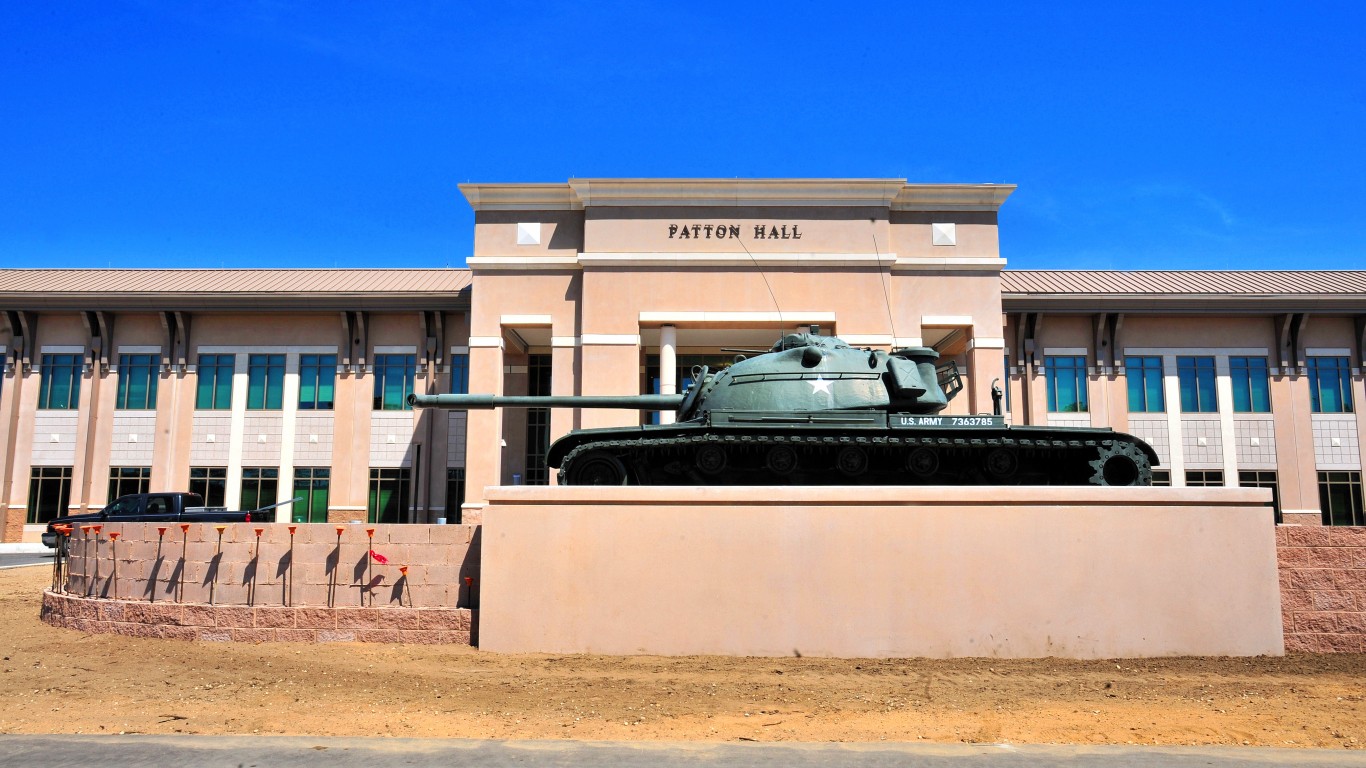
13. Sumter, SC
> Military members & families: 12,342 (11.5% of pop.)
> Largest military base: Shaw Air Force Base
> Veterans: 12,867 (12.0% of pop.)
The Sumter metro area is home to Shaw Air Force Base, one of the oldest Air Force installations in the country. Shaw AFB is home to the 20th Fighter Wing, the largest combat F-16 wing in the Air Force. The 20th Fighter Wing was established in 1947, and conducted combat missions against Iraqi forces during the Persian Gulf War, including Operation Desert Storm. It executed patrol missions over several major U.S. cities following the 9/11 terrorist attacks. Shaw has a total of 12,342 active servicemen and servicewomen and dependents, making up 11.5% of the metro area population. Shaw is also the largest employer in Sumter, accounting for 22.0% of total employment in the city.
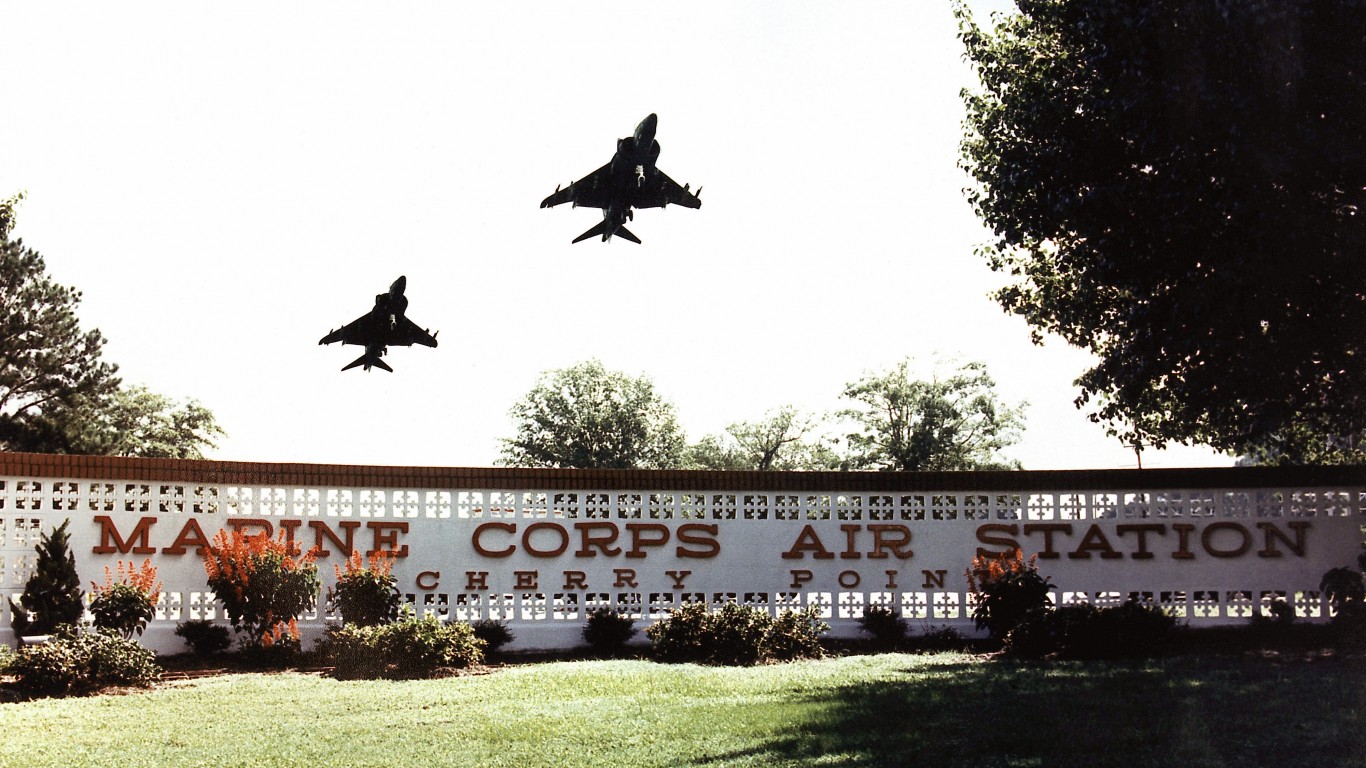
12. New Bern, NC
> Military members & families: 15,219 (12.2% of pop.)
> Largest military base: Cherry Point Marine Corps Air Station
> Veterans: 18,844 (15.1% of pop.)
Both the Cherry Point Marine Corps Air Station and the Cherry Point Naval Aviation installations are located in the New Bern, North Carolina metro area. Together, the bases are home to some 7,500 active duty service men and women and many of their 7,700 dependents. The Marine Air Station is far and away the largest of the two bases, accounting for about 94% of on-base military personnel and family members in the metro area.
Cherry Point Marine Corps Air Station served as a training facility for troops headed to the Pacific theater in WWII. The base also played a role in combat operations during the Korean War, the Vietnam War, Desert Storm, and the recent conflicts in Iraq in Afghanistan. Today, the base has a number of on-site amenities and services including shopping, restaurants, entertainment, and counseling to accommodate the families of service members.
[in-text-ad-2]
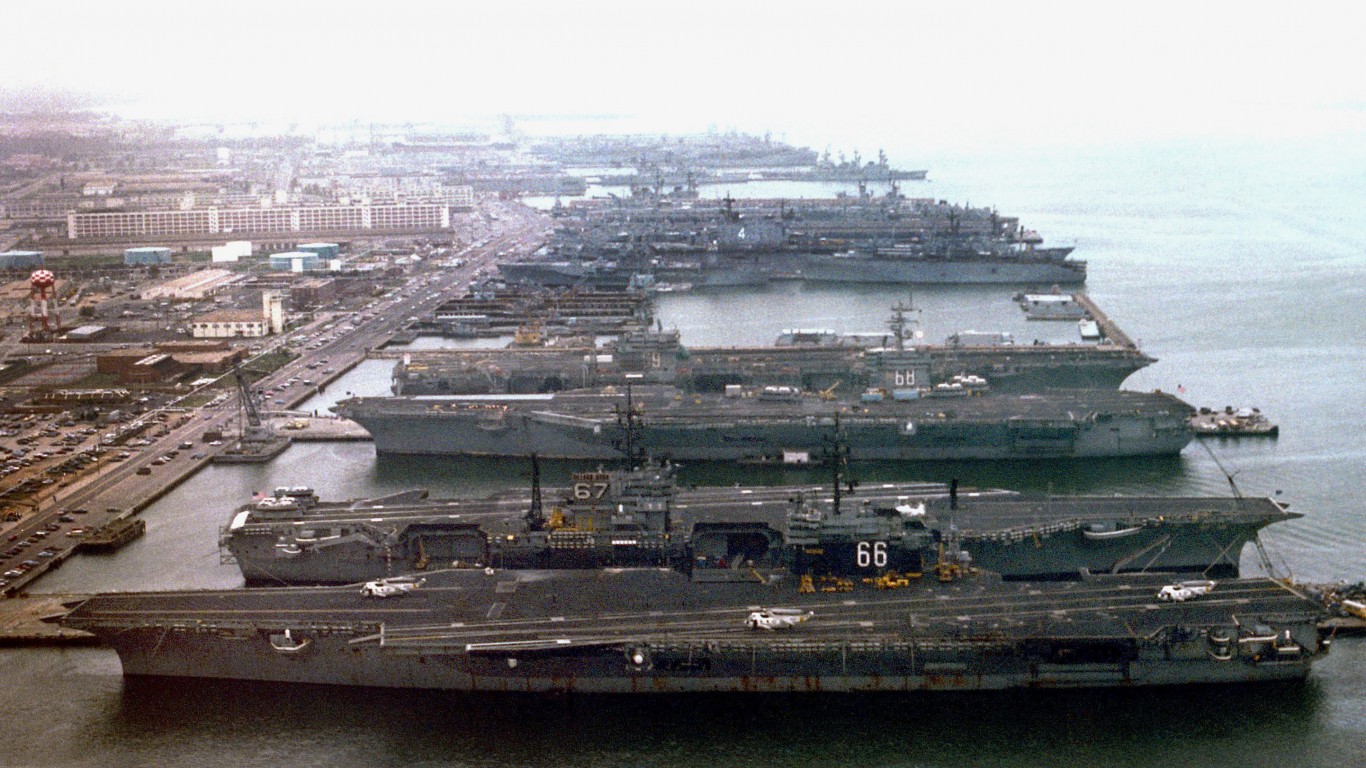
11. Virginia Beach-Norfolk-Newport News, VA-NC
> Military members & families: 223,157 (12.9% of pop.)
> Largest military base: Norfolk Naval Base
> Veterans: 232,704 (13.5% of pop.)
The Virginia Beach metro area is home to the largest military population of any city. Comprising 10 military installations, Virginia Beach hosts 97,370 active servicemen and women and many of their 125,787 dependents, the largest military population of any metro area. The largest military installation in the area is the Naval Station Norfolk, the largest concentration of naval forces in the United States.
Virginia Beach also has a major presence of veterans. Exiting military personnel most commonly work as electrical mechanics, law enforcement workers, and automobile mechanics in the Hampton Roads area. Veterans constitute 13.5% of the metro area population, more than twice the 6.2% national average.
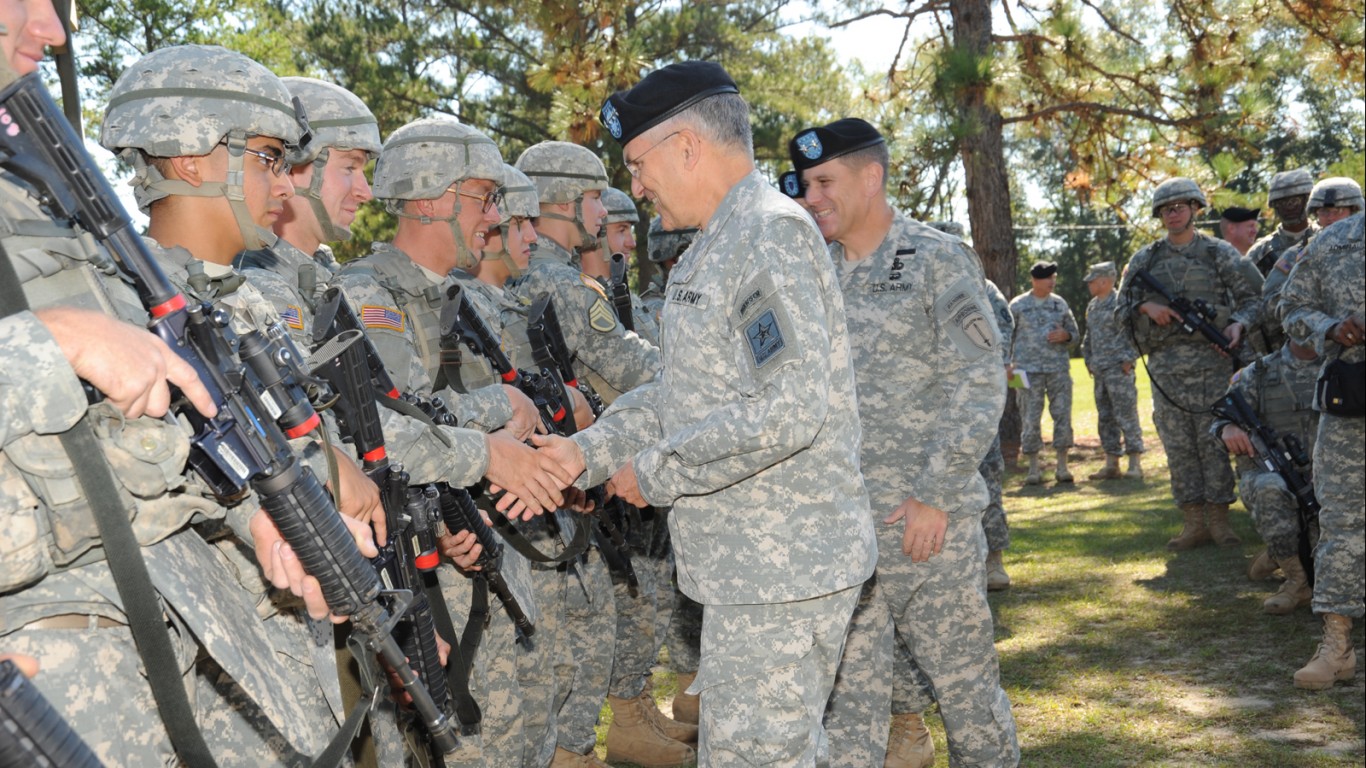
10. Columbus, GA-AL
> Military members & families: 40,563 (13.2% of pop.)
> Largest military base: Fort Benning
> Veterans: 36,821 (12.0% of pop.)
As measured by the number of on-base active duty servicemen and women, Fort Benning is the largest military installation in Georgia. The Fort Benning Army base hosts some 19,900 active duty servicemen and women as well as many of their 20,600 of their dependents. The number of base personnel is equivalent to 13.2% of the Columbus metro area in which the base is located.
Fort Benning serves as a training center for new Army recruits. The Army’s fiscal 2019 budget called for a net addition of some 4,000 new troops — and the need to train them has created a backlog at Fort Benning. Some 400 new recruits at the installation may have to wait up to three weeks to begin basic training — longer than the usual one to two weeks.
[in-text-ad]
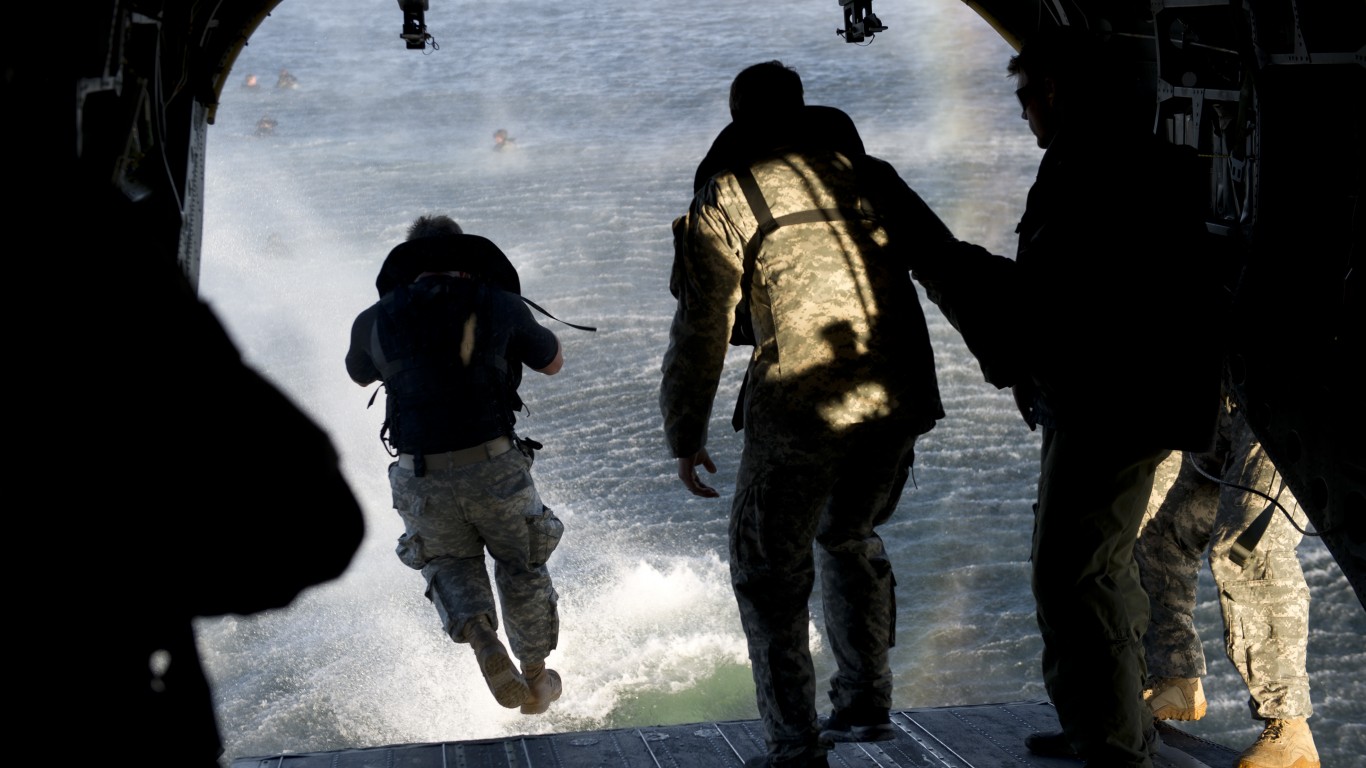
9. Crestview-Fort Walton Beach-Destin, FL
> Military members & families: 37,641 (14.1% of pop.)
> Largest military base: Eglin Air Force Base
> Veterans: 42,612 (16.0% of pop.)
The U.S. Air Force has two installations in the Crestview-Fort Walton Beach-Destin metro area: the Eglin Air Force Base and Hurlburt Field. Together, the installations house thousands of servicemen and women, as well as many of their family members — equivalent to 14.1% of the metro area’s total population.
Eglin AFB, the largest military installation in the area, has served as a missile technology test site and flight training ground for decades — aiding U.S. military efforts from World War II to the most recent war in Iraq. Some of the land that would become the base was donated to the U.S. government during the Great Depression by a local businessman who thought a military payroll would give the local economy a boost. Today, military installations in northwestern Florida like Eglin AFB bring an estimated $22.1 billion to the economy and support some 182,449 jobs.
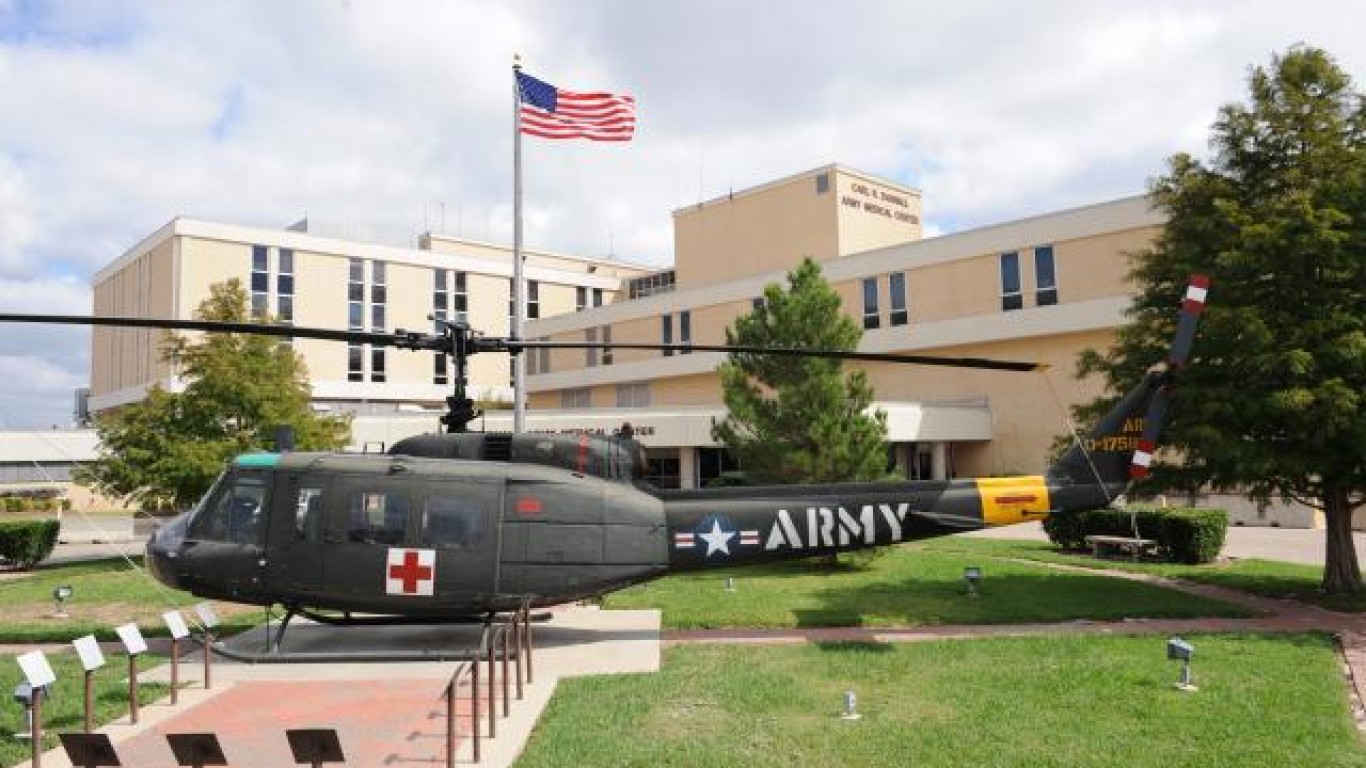
8. Killeen-Temple, TX
> Military members & families: 80,667 (18.5% of pop.)
> Largest military base: Fort Hood
> Veterans: 77,061 (17.7% of pop.)
Fort Hood is far and away the largest military installation in Texas. The army base is home to some 75,000 service men and women and their families. Including veterans, the number of individuals affiliated with the military in the area is equal to over 36% of the metro area population.
Originally comprised of 108,000 acres, Fort Hood served as a testing and development site for anti-tank guns during World War II. Today, the base is a home and training facility for combat soldiers, and is the largest active duty post in the U.S. Armed Services.
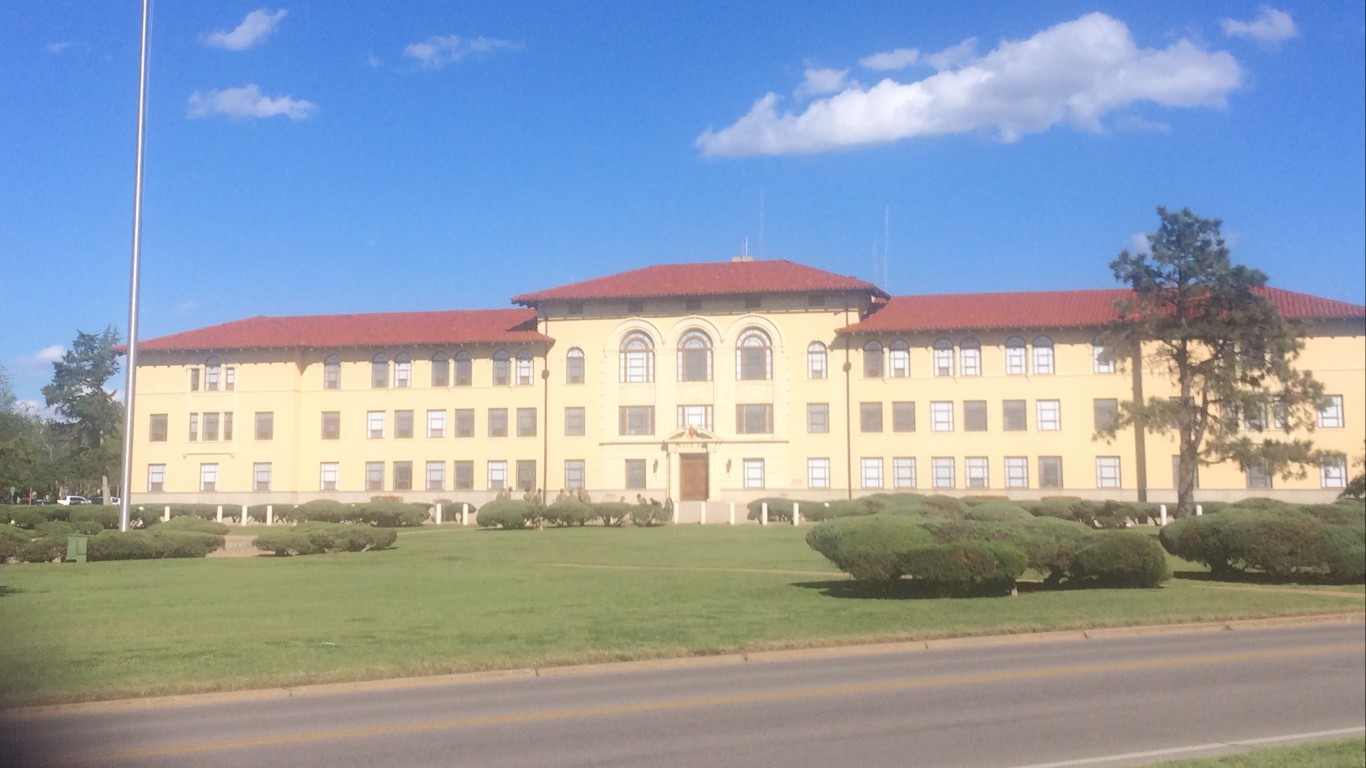
7. Lawton, OK
> Military members & families: 25,169 (19.7% of pop.)
> Largest military base: Fort Sill
> Veterans: 20,104 (15.7% of pop.)
Fort Sill is home to the U.S. Army Field Artillery School, which trains approximately 9,000 soldiers and Marines every year in fire support techniques and procedures. Fort Sill is also home to several field artillery brigades and the U.S. Army Air Defense Artillery School. In total, the army base supports 11,766 active servicemen and servicewomen and many of the 13,403 spouses and family members associated with them. Military personnel and their dependents amount to 19.7% of the Lawton metro area population, the seventh largest share of any U.S. city.
Veterans also have a major presence in the metro area. The 20,104 veterans living in Lawton constitute 15.7% of the metro area population, the seventh largest share in the country.
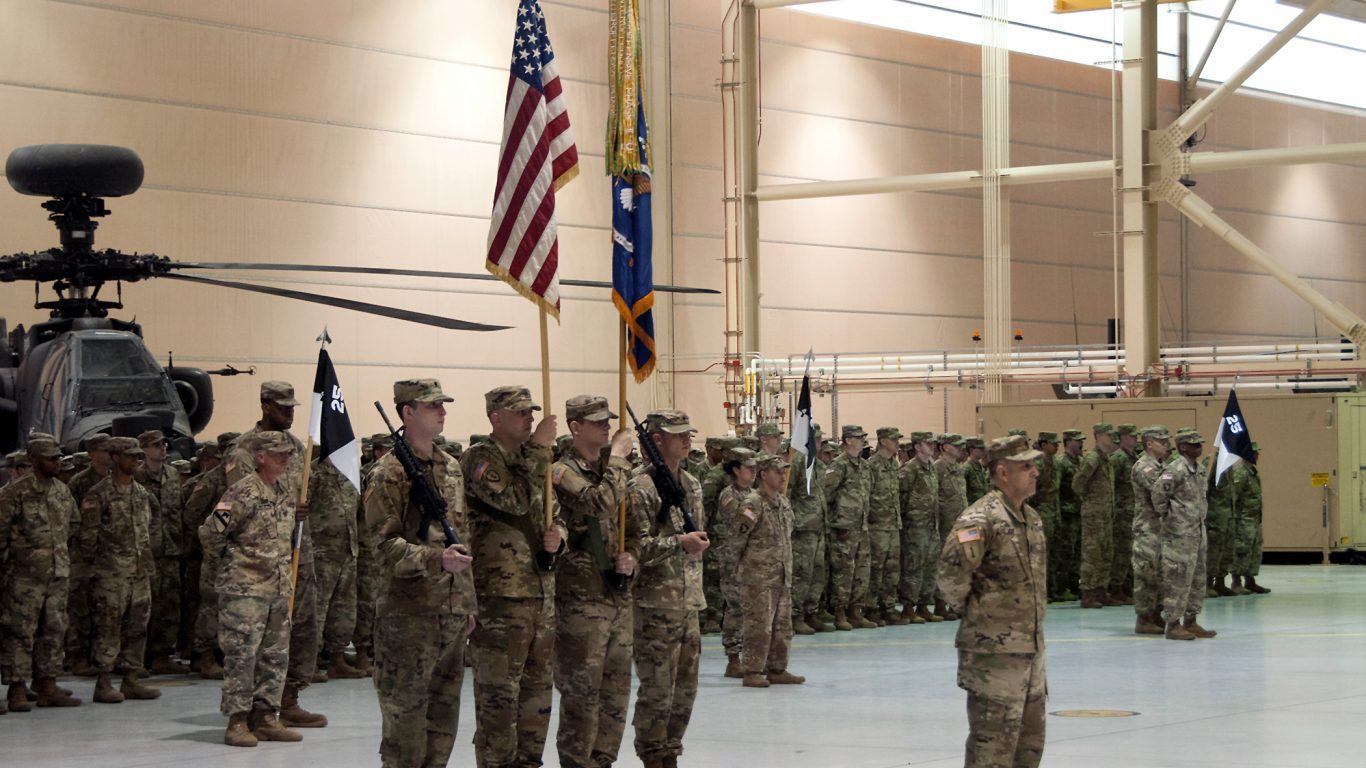
6. Fairbanks, AK
> Military members & families: 21,037 (20.9% of pop.)
> Largest military base: Fort Jonathan Wainwright
> Veterans: 12,196 (12.1% of pop.)
Fort Wainwright, a U.S. Army post located just outside Fairbanks, is by far the largest military installation in Alaska. The base is home to some 7,200 active duty personnel and is associated with with 9,600 dependents. The Fairbanks metro area is also home to the Eielson Air Force Base, which has 4,300 personnel — including military service members and their dependents. All told, the number of active duty servicemen and women in Fairbanks is equal to 20.9% of the metro area’s population.
Eielson AFB is home to the 354th Fighter Wing and serves a training facility and staging ground for forces furthering U.S. interests in the Asia-Pacific region. Fort Wainwright originated as an Air Force base in 1939 and was transferred to the Army in 1961, and currently serves as a training facility and base for combat operations across the globe.
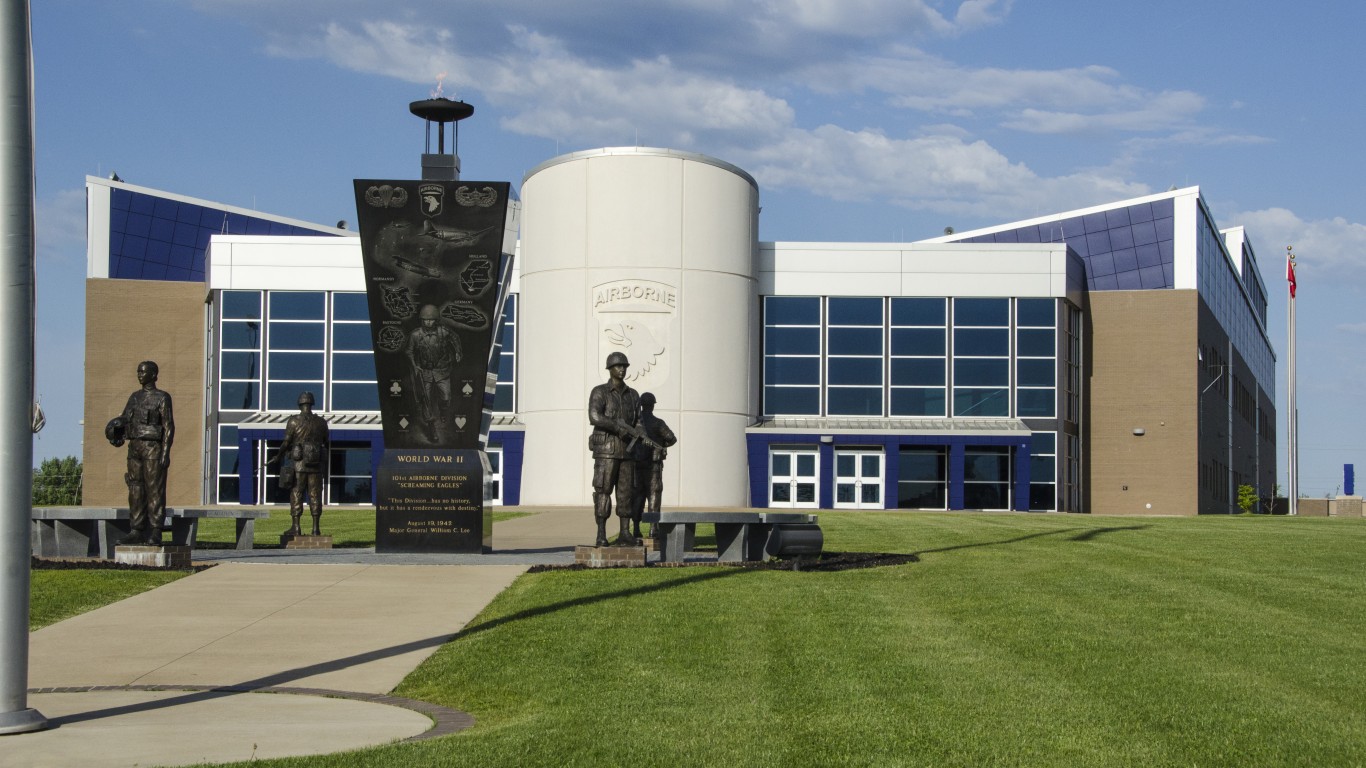
5. Clarksville, TN-KY
> Military members & families: 67,507 (23.9% of pop.)
> Largest military base: Fort Campbell
> Veterans: 45,693 (16.2% of pop.)
The largest military installation in the Clarksville metro area is Fort Campbell, the platform for a number of the military’s major air assault operations. It is home to the 101st Airborne Division, the Army’s only air assault division, as well as the 5th Special Forces Group, the 160th Special Operations Aviation Regiment, and the 52nd Ordnance Group. Members of the he 101st, known as the “Screaming Eagles,” perform an average of 70 air shows throughout the year.
There are a total of 27,335 enlisted servicemen and servicewomen at Fort Campbell, comprising 9.7% of the Clarksville metro area population. Including the 40,172 spouses and family members affiliated with the army base, there are a total of 67,507 military personnel in Clarksville — the ninth largest personnel and dependent population by size and the fifth largest when adjusted for the size of the metro area.
[in-text-ad]
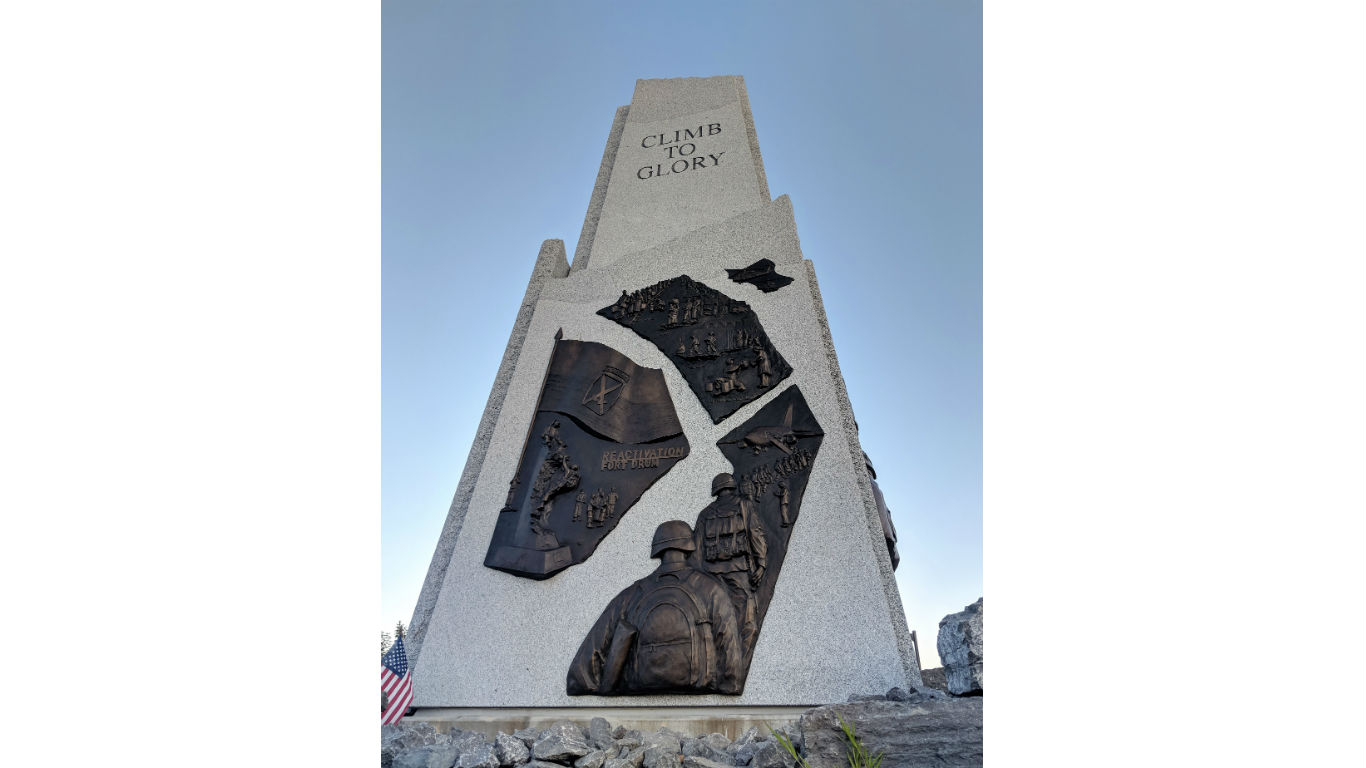
4. Watertown-Fort Drum, NY
> Military members & families: 34,736 (30.5% of pop.)
> Largest military base: Fort Drum
> Veterans: 15,401 (13.5% of pop.)
Fort Drum is far and away the largest military installation in the northeast region of the United States. Located about 70 miles north of Syracuse off Interstate 81, the base is home to over 15,000 active duty personnel who have nearly 20,000 dependents, equal to 30.5% of the Watertown-Fort Drum metro area.
The fort is an integral part of the metro area economy. Fort Drum’s economic contribution to the state totalled $1.4 billion in 2014 alone. The base is home to the U.S. Army’s 10th Mountain Division and will serve as the venue for President Donald Trump’s signing of a $717 billion defense bill aimed at bolstering the military.
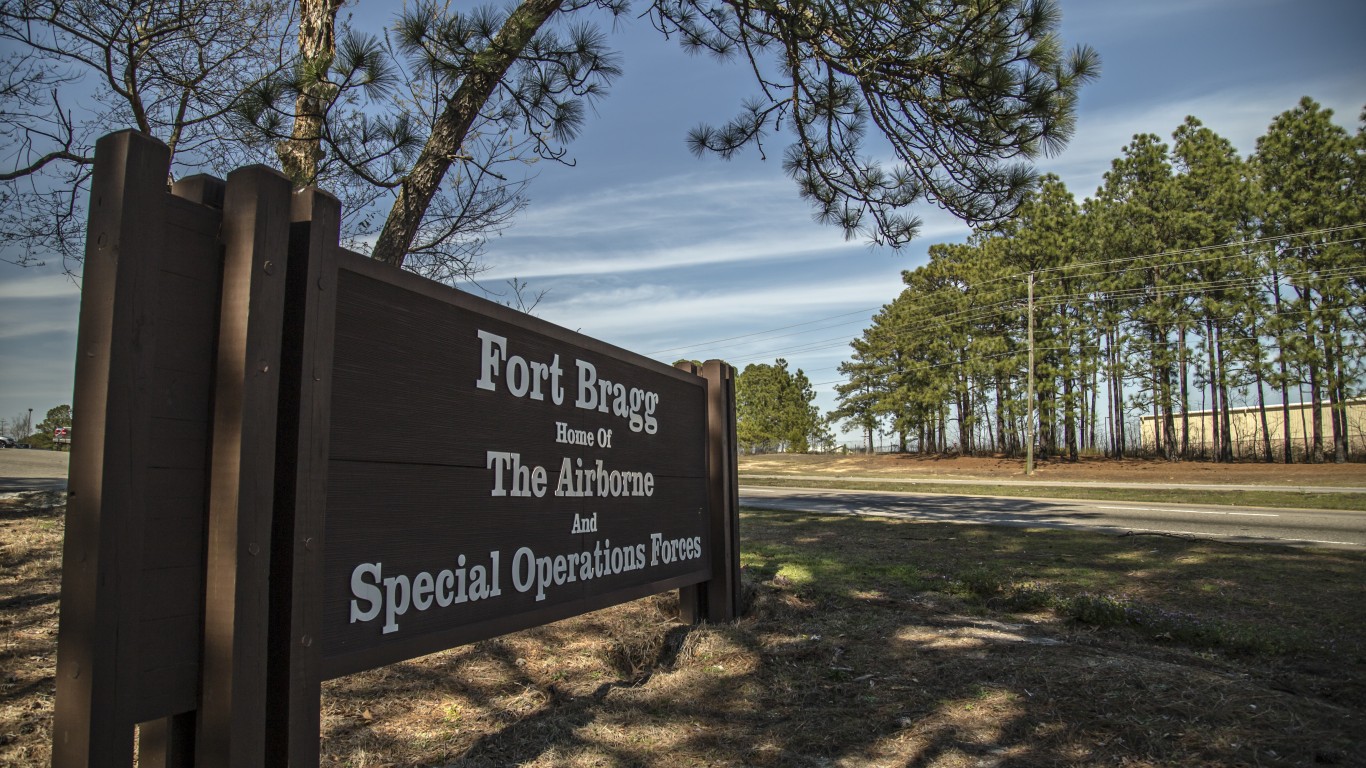
3. Fayetteville, NC
> Military members & families: 117,598 (30.9% of pop.)
> Largest military base: Fort Bragg
> Veterans: 66,401 (17.5% of pop.)
Fayetteville is home to Fort Bragg, one of the largest military complexes in the world. It is the home of the U.S. Army’s XVIII Airborne Corps and the 82nd Airborne Division, as well as the U.S. Army Special Operations Command and 3rd Special Forces Group. Fayetteville is also home to Pope Air Force Base, which was absorbed into Fort Bragg and renamed Pope Field in 2011 as part of the 2005 Base Realignment and Closure plan.
There are 45,153 active servicemen and servicewomen in Fort Bragg, the second largest enlisted population of any U.S. military base. The population of service members at Fort Bragg and their families amounts to 30.9% of the Fayetteville metro area, the largest share of any metro area other than Manhattan, Kansas and Hinesville, Georgia.

2. Manhattan, KS
> Military members & families: 38,868 (40.1% of pop.)
> Largest military base: Fort Riley
> Veterans: 9,179 (9.5% of pop.)
The Manhattan metro area is home to Fort Riley, an army base with some 15,865 active servicemen and servicewomen who support some 23,003 spouses and family members. The total Fort Riley military personnel population and their associated dependents is equivalent to 40.1% of the metro area population, nearly the largest military presence of any city relative to its size. In addition to its large military population, Fort Riley employs 5,731 civilian employees, making it second largest employer in Manhattan, Kansas.
Fort Riley houses the 1st Infantry Division, the oldest continuously serving division in the U.S. Army. Units assigned to Fort Riley have supported Operation Enduring Freedom, Operation Iraqi Freedom, and Operation New Dawn. Fort Riley was also recently the training site for Military Transition Teams deploying to the Middle East to advise foreign security forces.
[in-text-ad-2]
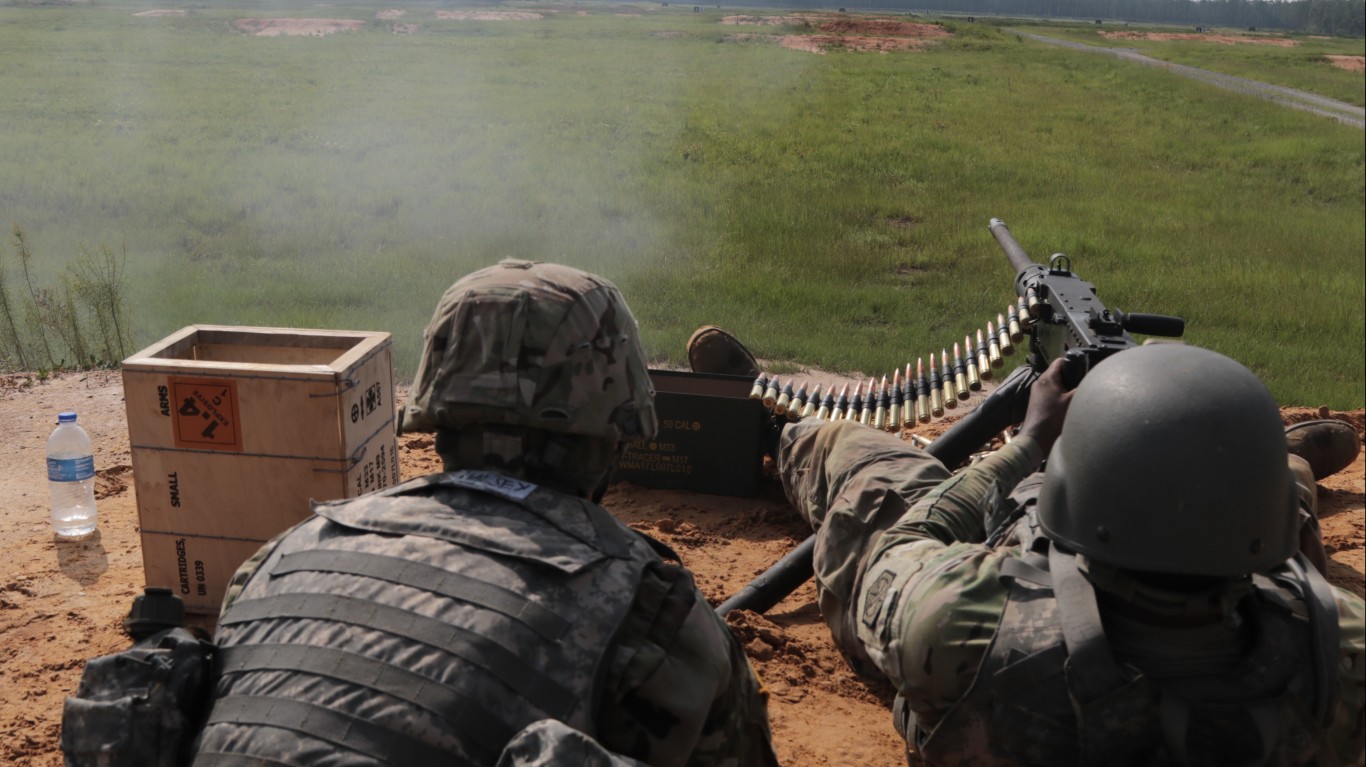
1. Hinesville, GA
> Military members & families: 49,692 (60.1% of pop.)
> Largest military base: Fort Stewart
> Veterans: 16,638 (20.1% of pop.)
The Hinesville metro area is home to Fort Stewart. The largest military installation east of the Mississippi River, Fort Stewart consists of approximately 280,000 acres of land and 19,791 active duty servicemen and servicewomen. Fort Stewart houses the 3rd Infantry Division, which has been one of the Army’s premier contingency operation units since it was activated in World War I.
Including the 29,901 spouses and family members affiliated with Fort Stewart, the number of military personnel are equal to 60.1% of the Hinesville metro area population, the largest share in the nation. In addition to Fort Stewart’s military personnel, the army base employs some 3,378 civilian employees, the most of any one employer and 10.5% of the workforce in the city of Hinesville and surrounding parts of Liberty County.
Detailed findings & methodology:
Some states have higher concentrations of active duty service men and women than others. For example, nearly half of all military personnel stationed in the United States live in just six states: California, Florida, Georgia, North Carolina, Texas, and Virginia. Not surprisingly, 11 of America’s 25 military cities are located in these states.
Every metro area on this list qualifies as a military city due to the presence of at least one major military base. These installations are used for a variety of purposes, including training and deploying troops and maintaining and testing weapons systems. For millions of active duty servicemen and women and their families, these installations are also their homes, often complete with on-site schools, medical facilities, and child care services.
America’s military cities contain bases for one or more service branches of the Army, Navy, Air Force, and the Marine Corps. The largest bases in the metro areas on this list range in size from Francis E. Warren Air Force Base in Cheyenne, Wyoming and its 6,433 personnel to the Naval Station Norfolk in the Virginia Beach metro area, which, with 144,727 active duty servicemen and women and family members, is the largest military installation in the country.
Reasons why the cities on this list are home to major military installations vary. Eglin Air Force Base in the Crestview, Florida metro area, for example, became the missile technology test site and flight training ground it is today because a local businessman donated much of the land to the U.S. Government during the Great Depression in hopes the military payroll would give the economy a boost.
Meanwhile, Fort Wainwright in the Fairbanks, Alaska metro area was initially established because the regional climate was ideal for testing aircraft in arctic conditions. Fort Hood, located in the Killeen-Temple, Texas metro area, served as a testing and development site for anti-tank guns during World War II because of the ample space it afforded.
The presence of bases like these has considerable social and economic impacts on the communities surrounding them. Among the metro areas on this list, the number of military personnel and their family members — represented as a share of the total population — ranges from 6.0% in California-Lexington Park, Maryland to 60.1% in Hinesville, Georgia.
The cities on this list also tend to have relatively large veteran populations. Nationwide, military veterans account for 6.2% of the population. Every metro area on this list has a higher concentration of military veterans than the U.S. as a whole — reaching as high as 20.1% of the total population in Hinesville, Georgia.
To identify America’s military cities, 24/7 Wall St. reviewed the total number of military personnel and their dependents stationed on bases located within metropolitan statistical areas, a geographic region defined by the U.S. Census Bureau that approximates the economic and social network surrounding a core city. Metro areas were ranked based on the number of military personnel and their families as a percentage of the metro area’s population. The dependent figures reflect the number of known dependents affiliated with active duty servicemen and women, whether or not they live within the metropolitan area. Data on military installations, including their locations and personnel counts, were accessed on August 8, 2018 from the 2016 Demographics Report, compiled by Defense Department contractor Military OneSource. Total metro area population and veteran population counts are from the U.S. Census Bureau’s 2016 American Community Survey.
Cash Back Credit Cards Have Never Been This Good
Credit card companies are at war, handing out free rewards and benefits to win the best customers. A good cash back card can be worth thousands of dollars a year in free money, not to mention other perks like travel, insurance, and access to fancy lounges. See our top picks for the best credit cards today. You won’t want to miss some of these offers.
Flywheel Publishing has partnered with CardRatings for our coverage of credit card products. Flywheel Publishing and CardRatings may receive a commission from card issuers.
Thank you for reading! Have some feedback for us?
Contact the 24/7 Wall St. editorial team.
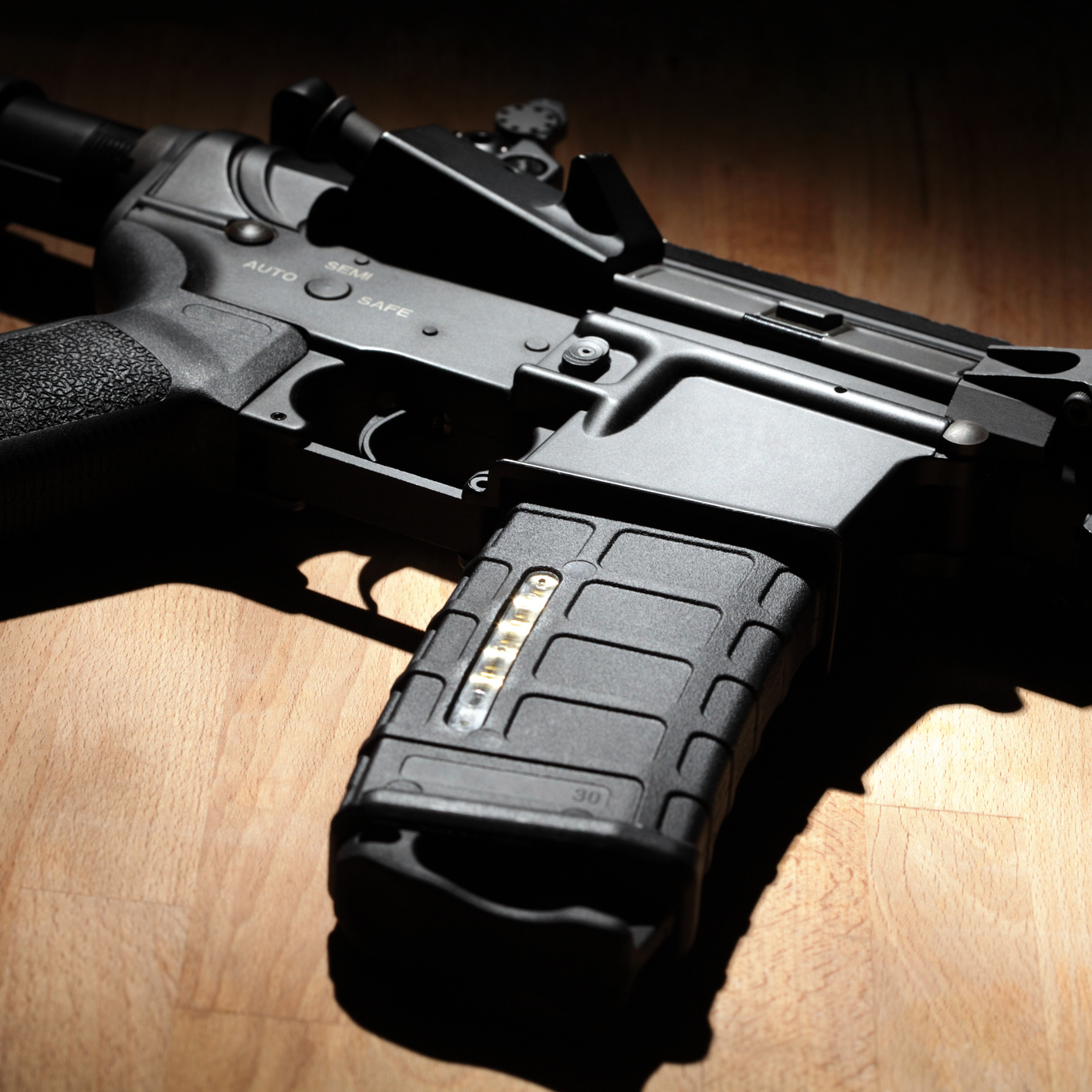 24/7 Wall St.
24/7 Wall St. 24/7 Wall St.
24/7 Wall St.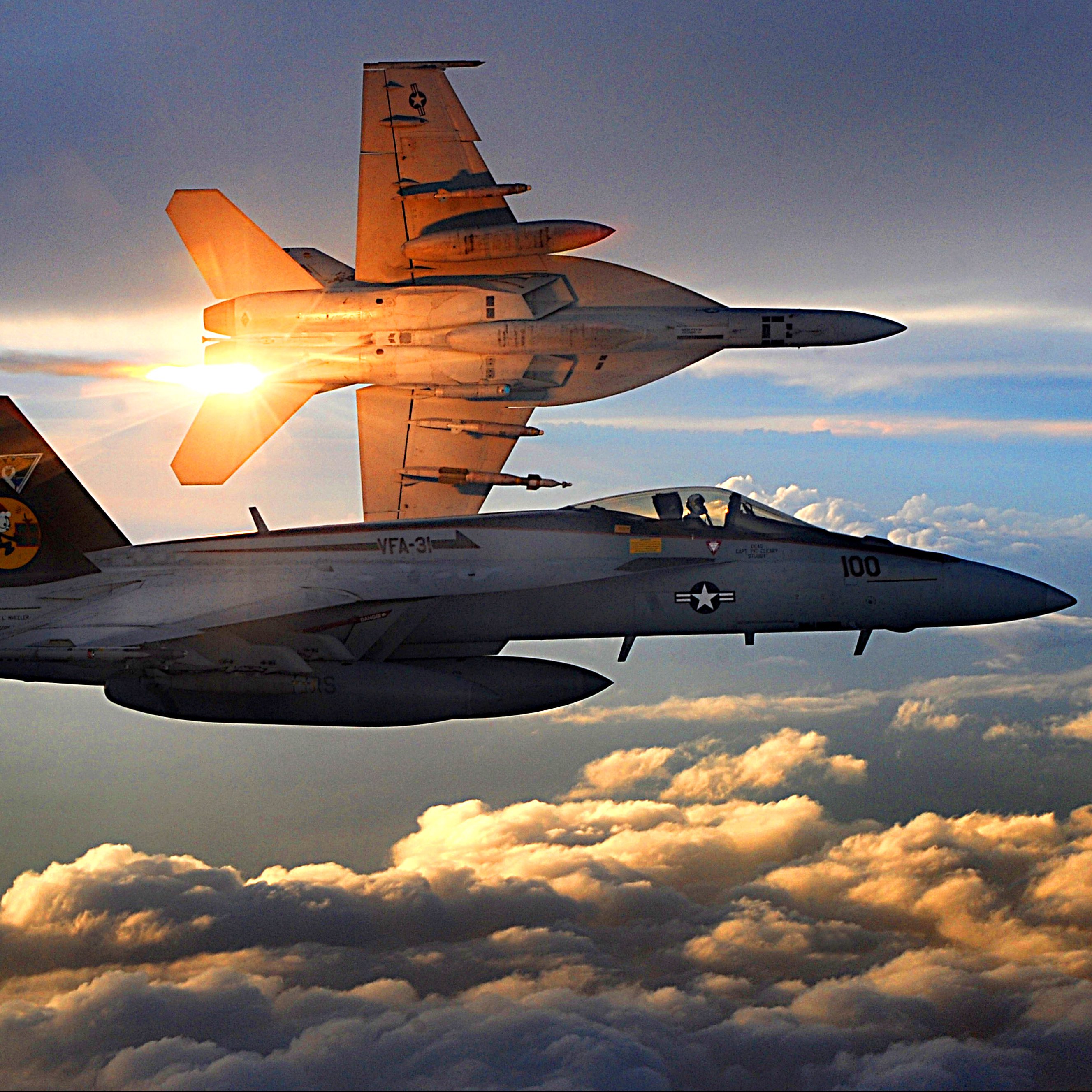 24/7 Wall St.
24/7 Wall St. 24/7 Wall St.
24/7 Wall St.

